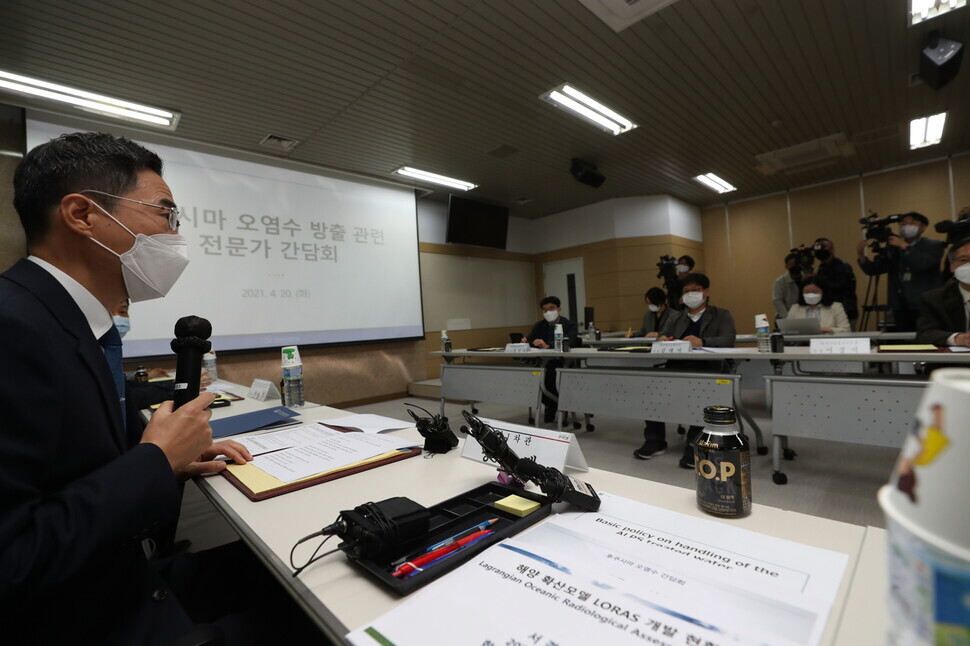hankyoreh
Links to other country sites 다른 나라 사이트 링크
Japanese data on Fukushima water release is unreliable, S. Korean experts say

Experts at a South Korean research institute have raised doubts about the credibility of Japanese data about treating radioactive water at the Fukushima nuclear power plant that Japan intends to dump into the ocean. The researchers want the South Korean government to seek internationally verified data.
“Urgently acquiring internationally verified data about the contaminated water at Fukushima is key to scientifically predicting what impact releasing that water will have on South Korea and when that impact will be felt,” said the researchers during a meeting with First Vice Science Minister Yong Hong-taek during his Tuesday visit to the Korea Atomic Energy Research Institute (KAERI).
Yong spoke with researchers in related fields while visiting the institute to check on research about Japan’s plan to discharge the contaminated water and on future research plans.
“The Japanese government isn’t being a responsible member of the international community when it claims the contaminated water is safe without providing South Korea or the world at large with specific and scientifically verified information about that water,” said the researchers who attended the meeting.
“The Japanese government needs to retract its recently announced plan to discharge the water and carry out a full assessment of all storage tanks holding the approximately 1.26 million tons of contaminated water,” the researchers said.
Suh Kyung-suk, head of KAERI’s nuclear environment safety research division, briefed Yong on the current status of efforts to develop a simulation to analyze the domestic impact of releasing the contaminated water and how that simulation might be improved in the future.
“Japan claims it has purified the contaminated water at the plant with [Advanced Liquid Processing System (ALPS)], but its data isn’t trustworthy. The government needs to acquire more accurate data so that we can run our simulation to predict the domestic impact,” Suh said.
The experts who attended the meeting also raised issues about the capabilities of ALPS, which Japan is currently using to treat the contaminated water.
“There have been times during the past decade when ALPS wasn’t functioning properly, and some tests have shown that the contaminated water in the tanks had radionuclide concentrations that were between five and 100 times the legally permitted limit,” said Song Jin-ho, a researcher at KAERI.
According to a report drafted by the Tokyo Electric Power Company in October 2018, two of the three ALPS devices used to treat the contaminated water exhibited shortcomings both in their ability to remove certain radionuclides and in the duration of their operation.
Yong responded to the researchers’ proposals as follows. “Once Japan develops a detailed plan for releasing the contaminated water into the ocean, we’ll work to immediately acquire concrete data about the levels of radioactivity in the water being released and the period of its release. We’ll use models for assessing the maritime dispersion of radioactive materials to thoroughly analyze and assess what impact there may be on the Korean environment and public health.”
By Kim Jeong-su, senior staff writer
Please direct comments or questions to [english@hani.co.kr]

Editorial・opinion
![[Column] When ‘fairness’ means hate and violence [Column] When ‘fairness’ means hate and violence](https://flexible.img.hani.co.kr/flexible/normal/500/300/imgdb/original/2024/0516/7417158465908824.jpg) [Column] When ‘fairness’ means hate and violence
[Column] When ‘fairness’ means hate and violence![[Editorial] Yoon must stop abusing authority to shield himself from investigation [Editorial] Yoon must stop abusing authority to shield himself from investigation](https://flexible.img.hani.co.kr/flexible/normal/500/300/imgdb/original/2024/0516/4417158464854198.jpg) [Editorial] Yoon must stop abusing authority to shield himself from investigation
[Editorial] Yoon must stop abusing authority to shield himself from investigation- [Column] US troop withdrawal from Korea could be the Acheson Line all over
- [Column] How to win back readers who’ve turned to YouTube for news
- [Column] Welcome to the president’s pity party
- [Editorial] Korea must respond firmly to Japan’s attempt to usurp Line
- [Editorial] Transfers of prosecutors investigating Korea’s first lady send chilling message
- [Column] Will Seoul’s ties with Moscow really recover on their own?
- [Column] Samsung’s ‘lost decade’ and Lee Jae-yong’s mismatched chopsticks
- [Correspondent’s column] The real reason the US is worried about Chinese ‘overcapacity’
Most viewed articles
- 1China calls US tariffs ‘madness,’ warns of full-on trade conflict
- 2[Column] US troop withdrawal from Korea could be the Acheson Line all over
- 3[Editorial] Yoon must stop abusing authority to shield himself from investigation
- 4[Column] When ‘fairness’ means hate and violence
- 5[Column] How to win back readers who’ve turned to YouTube for news
- 6US has always pulled troops from Korea unilaterally — is Yoon prepared for it to happen again?
- 7[Book review] Who said Asians can’t make some good trouble?
- 8Naver’s union calls for action from government over possible Japanese buyout of Line
- 9Could Korea’s Naver lose control of Line to Japan?
- 10[Editorial] Korea must respond firmly to Japan’s attempt to usurp Line